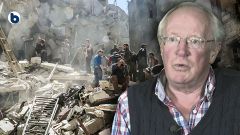Robert Fisk
( journalist) | |
|---|---|
 Reporting from Syria, April 2018 | |
| Born | 1946-07-12 Maidstone, Kent, England |
| Died | 30 October 2020 (Age 74) Dublin, Ireland |
| Alma mater | • Lancaster University • Trinity College (Dublin) |
| Spouse | Lara Marlowe |
| Interests | |
| Interest of | "Philip Cross" |
Robert Fisk was one of the most highly regarded and controversial British foreign correspondents of the modern era and was described by the New York Times in 2005 as “probably the most famous foreign correspondent in Britain”.[1]
Contents
Journalism
From 1972 to 1975, Robert Fisk was The Times Belfast correspondent, before being posted to Portugal following the Carnation Revolution in 1974. Fisk then was appointed Middle East correspondent (1976–1988). When a story of his was spiked (Iran Air Flight 655) after Rupert Murdoch's takeover, he moved to The Independent in April 1989 and is primarily based in Beirut.[2]
Author
- "The Point of No Return: The Strike which Broke the British in Ulster" (1975). London: Times Books/Deutsch. ISBN 0-233-96682-X
- "In Time of War: Ireland, Ulster and the Price of Neutrality, 1939–1945" (2001). London: Gill & Macmillan. ISBN 0-7171-2411-8 (1st ed. 1983).
- "Pity the Nation : Lebanon at War" (3rd ed. 2001). London: Oxford University Press; xxi, 727 pages. ISBN 0-19-280130-9 (1st ed. was 1990).
- "The Great War for Civilisation: The Conquest of the Middle East" (October 2005) London. Fourth Estate; xxvi, 1366 pages. ISBN 1-84115-007-X
- "The Age of the Warrior: Selected Writings" (2008) London, Fourth Estate ISBN 978-0-00-727073-6
- "Robert Fisk on Algeria" (2013) Independent Print Limited
Video documentary
Robert Fisk produced a three-part series titled "From Beirut To Bosnia" in 1993 which Fisk says was an attempt "to find out why an increasing number of Muslims had come to hate the West."[3] Fisk says that the Discovery Channel did not show a repeat of the films, after initially showing them in full, due to a letter campaign launched by pro-Israel groups such as Committee for Accuracy in Middle East Reporting in America (CAMERA).[4]
Documents by Robert Fisk
| Title | Document type | Publication date | Subject(s) | Description |
|---|---|---|---|---|
| Document:Robert Fisk visits the Syria clinic at the centre of a global crisis | Wikispooks Page | 17 April 2018 | Theresa May White Helmets Organisation for the Prohibition of Chemical Weapons Douma attack | "A Syrian colonel I came across behind one of these buildings asked if I wanted to see how deep the tunnels were. I stopped after well over a mile when he cryptically observed that 'this tunnel might reach as far as Britain'. Ah yes, Ms May, I remembered, whose air strikes had been so intimately connected to this place of tunnels and dust. And gas?" |
| Document:Those who flaunt the poppy on their lapels | article | 5 November 2011 | Remembrance Sunday Red Poppy | Why Robert Fisk stopped wearing a red poppy |
| Document:We are the war criminals now | Article | 29 November 2001 | Tony Blair George W. Bush Osama bin Laden War crime Donald Rumsfeld Taliban Northern Alliance The Great War for Civilisation Afghanistan/2001 Invasion | George W. Bush says that "you are either for us or against us" in the war for civilisation against evil. Well, I'm sure not for bin Laden. But I'm not for Bush. I'm actively against the brutal, cynical, lying "war of civilisation" that he has begun so mendaciously in our name and which has now cost as many lives as the World Trade Center mass murder. |
Quotes by Robert Fisk
| Page | Quote | Date | Source |
|---|---|---|---|
| Sherard Cowper-Coles | “Indeed, I remember way back in the late 1970s - when I was Middle East correspondent for The Times - how a British diplomat in Cairo tried to persuade me to fire my local "stringer", an Egyptian Coptic woman who also worked as a correspondent for the Associated Press and who provided a competent coverage of the country when I was in Beirut. "She isn't much good," he said, and suggested I hire a young Englishwoman whom he knew and who - so I later heard - had close contacts in the Foreign Office.
| 30 June 2007 | The Independent |
| Fallujah | “The pictures flash up on a screen on an upper floor of the Fallujah General Hospital. And all at once, Nadhem Shokr al-Hadidi's administration office becomes a little chamber of horrors. A baby with a hugely deformed mouth. A child with a defect of the spinal cord, material from the spine outside the body. A baby with a terrible, vast Cyclopean eye. Another baby with only half a head, stillborn like the rest, date of birth 17 June, 2009. Yet another picture flicks onto the screen: date of birth 6 July 2009, it shows a tiny child with half a right arm, no left leg, no genitalia. "We see this all the time now," Al-Hadidi says, and a female doctor walks into the room and glances at the screen. She has delivered some of these still-born children. "I've never seen anything as bad as this in all my service," she says quietly.” | April 2012 | |
| Journalist | “And I think, in the end, that is the best definition of journalism I have heard; to challenge authority - all authority - especially so when governments and politicians take us to war, when they have decided that they will kill and others will die.” |
References
Wikipedia is not affiliated with Wikispooks. Original page source here